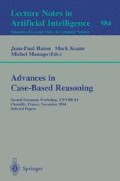Abstract
TRUTH-TELLER, a program for testing a Case-Based Reasoning (CBR) knowledge representation in practical ethics, compares cases presenting ethical dilemmas about whether to tell the truth. Its comparisons list ethically relevant similarities and differences (i.e., reasons for telling or not telling the truth which apply to both cases, and reasons which apply more strongly in one case than another or which apply only to one case). The program reasons about reasons in generating context-sensitive comparisons. The reasons may invoke ethical principles or selfish considerations. We describe a knowledge representation for this practical ethical domain including representations for reasons and principles, truth telling episodes, contextually important scenarios, and comparison rules. In a preliminary evaluation, a professional ethicist scored the program's output for randomly-selected pairs of cases. The work contributes to AI CBR efforts to integrate general principles and context-sensitive information in symbolically assessing case similarity and to model comparing problems to paradigmatic cases. It also furthers research on cognitive and philosophical models of ethical judgement and decision-making.
This Work is supported by The Andrew W. Mellon Foundation. We are grateful to Athena Beldecos for her research on casuistic models and data collection of case comparison protocols. We are also grateful to Ken Schaffner, University Professor of Medical Humanities, George Washington University, for participating in our preliminary evaluation. Vincent Aleven has given us good advice in designing our evaluation.
Preview
Unable to display preview. Download preview PDF.
References
Ashley, K. D. (1990). Modeling Legal Argument: Reasoning with Cases and Hypotheticals. MIT Press, Cambridge. Based on Ashley's 1987 PhD. Dissertation, University of Massachusetts, COINS Technical Report No. 88-01.
Bareiss, E. R. (1989). Exemplar-Based Knowledge Acquisition — A Unified Approach to Concept Representation, Classification, and Learning. Academic Press, San Diego, CA. Based on PhD thesis, University of Texas, 1988.
Beauchamp, T., & McCullough, L. B. (1984). Medical Ethics: The Moral Responsibilities of Physicians. Prentice-Hall, Englewood Cliffs, NJ.
Bok, S. (1989). Lying. Random House, Inc. Vintage Books, New York.
Edelson, D. C. (1992). When Should A Cheetah Remind You of a Bat? Reminding in Case-Based Teaching. In Proceedings AAAI-92, pp. 667–672. American Association for Artificial Intelligence. San Jose, CA.
Jonsen, A. R., & Toulmin, S. (1988). The Abuse of Casuistry A History of Moral Reasoning. University of California Press, Berkeley.
Kass, A. M., Leake, D., & Owens, C. C. (1986). Swale: A Program that Explains. In Schanck, R. C. (Ed.), Explanation Patterns: Understanding Mechanically and Creatively. Lawrence Erlbaum Associates, Hillsdale, NJ.
Littman, D., & Soloway, E. (1988). Evaluating ITSs: The Cognitive Science Perspective. In Poison, M. C., & Richardson, J. J. (Eds.), Foundations of Intelligent Tutoring Systems. Lawrence Erlbaum Associates, Hillsdale, NJ.
MacGregor, R. (1991). The Evolving Technology of Classification-Based Knowledge Representation Systems. In Sowa, J. F. (Ed.), Principles of Semantic Networks: Explorations in the Representation of Knowledge, pp. 385–400. Morgan Kaufmann, San Mateo, CA.
Rissland, E. L., Skalak, D. B., & Friedman, M. T. (1993). BankXX: A Program to Generate Argument through Case-Base Search. In Fourth International Conference on Artificial Intelligence and Law Vrie Universiteit, Amsterdam.
Schaffner, K. F. (1990). Case-Based Reasoning in Law and Ethics. Presentation at the “Foundations of Bioethics” Conference. Hastings Center.
Strong, C. (1988). Justification in Ethics. In Brody, B. A. (Ed.), Moral Theory and Moral Judgments in Medical Ethics, pp. 193–211. Kluwer Academic Publishers, Dordrecht.
Veloso, M. M. (1992). Learning by Analogical Reasoning in General Problem Solving. Ph.D. thesis, Carnegie Mellon University. Technical Report No. CMU-CS-92-174.
Woods, W. A., & Schmolze, J. G. (1990). The KL-ONE Family. Tech. rep. TR-20-90, Center for Research in Computing Technology, Harvard University, Cambridge, MA.
Author information
Authors and Affiliations
Editor information
Rights and permissions
Copyright information
© 1995 Springer-Verlag Berlin Heidelberg
About this paper
Cite this paper
Ashley, K.D., McLaren, B.M. (1995). A CBR knowledge representation for practical ethics. In: Haton, JP., Keane, M., Manago, M. (eds) Advances in Case-Based Reasoning. EWCBR 1994. Lecture Notes in Computer Science, vol 984. Springer, Berlin, Heidelberg. https://doi.org/10.1007/3-540-60364-6_36
Download citation
DOI: https://doi.org/10.1007/3-540-60364-6_36
Published:
Publisher Name: Springer, Berlin, Heidelberg
Print ISBN: 978-3-540-60364-1
Online ISBN: 978-3-540-45052-8
eBook Packages: Springer Book Archive

